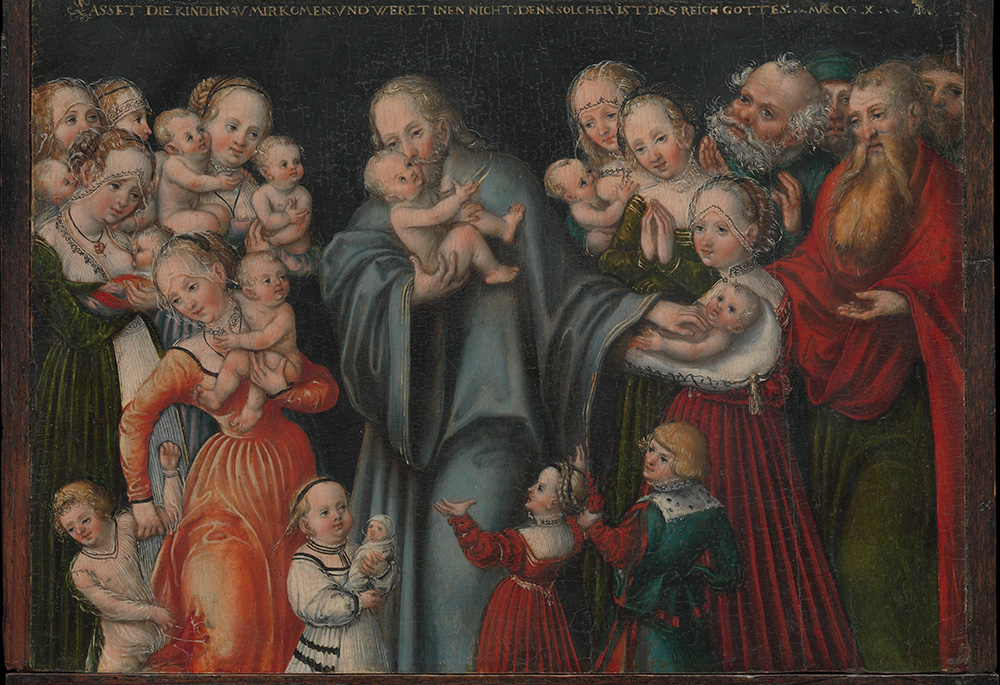
"Christ Blessing the Children," by Lucas Cranach the Younger and Workshop, a 1545-50 painting (Metropolitan Museum of Art)
To live meaningfully, a solid foundation is required to ensure that one will weather the storms of life and leave behind a legacy. In his encyclical Evangelium Vitae Pope John Paul II appealed to each person to: "respect, protect, love and serve life, every human life!" We are to recall that "in the image of God, he created them; male and female he created them" (Genesis 1:27). Therefore, each person is the bearer of God's image, regardless of age.
It is not enough to preserve life from conception to natural death; the quality of life that people have, the values they receive through their life journey, and the ability they have to give back to society are as important. Every phase of human life matters; by old age the person will have lived through all the age brackets. This implies that how people live their youthful days has a bearing on the kind of old age they lead.
I have observed that in our society the cohort between birth and 15 years old is sometimes ignored — yet those are the formative years that give society the future adults who take over the mantle when the elderly retire or are no longer with us. It is almost like they are present, yet absent. Many times, they are not considered as real people with thoughts, feelings, esteem and dignity to be protected. I perceive a lot of insensitivity towards them.
Parents separated from each other, and people opting to have a baby without committing themselves in marriage is on the rise. Some people publicly tarnish each other — for example by posting their supposedly private life stories on social media — and the children are put in the middle of these wrangles. Corresponding to that, many times family life is not peaceful, some couples are living together in a negative coexistence, where conflict in the presence of their children is the order of the day.
In these contexts, the children suffer emotionally and psychologically, and this may affect their growth — and their performance in school. They may appear not to understand much. However, they have feelings and pride, and they suffer silently. Some may grow up feeling ashamed of their family background.
On social media we see references to "baby mama" and "baby daddy" — referring to the mother of a man's child (particularly one who is not his wife or present partner), and the father of a woman's child (particularly one who is not her husband or existing partner). When some of the women start complaining, they talk about "deadbeat dads" (a father who neglects his parental role) and the responses from the "netizens" are sometimes shameful.
I think parents forget that many children — even before the age of 7 — have access to phones and internet, and so have access to some of the content shared about them and their parents. Imagine a child in such a context — how unlucky they must feel to be born in such circumstances. With this kind of baggage, they are still expected to perform and thrive like their contemporaries from stable families. This seems like a casual way of handling family life.
It is high time we created a homelike environment in our society, so that children who may not experience it under their parents' roof may find it in every corner of our society.
Advertisement
Children add beauty to our lives. When I am in the company of mothers, our visit hardly ever ends before they share something about their children. The same applies to those who work closely with children — for instance, teachers. Their conversations will always include something about the children with whom they spend most of their waking hours. I always think that working with children must be rewarding.
We should be proud to know that each moment we spend making a child's life better, we are also making our tomorrow better. What we pass on to the children today is what they will give back to our society. It makes me glad to see children playing freely, enjoying security and love from society. Most mornings on my way to church, I come across children going to school. Amid the traffic jam, drivers in private and public transport stop to give way to the children. Some people even help them cross the road. This is a great gesture of love and makes the children feel safe. Every grownup has an obligation to take care of children.
That many governments and organizations — especially Catholic institutions — are putting a lot of emphasis on child protection, validates our call to care for children. They mirror to us the content of what we have lived and passed on to them through our words and actions. Children are fully human with their own dignity. "First impressions last," so what they see in us is taken as the gospel truth.
They continue to hurt when ugly things are said to them: about their families, when their parents fight, when they separate, when one spouse kills the other, or even worse, when one parent kills the whole family, denying the children a chance to live. We rarely if ever take a moment to reflect about the situation of children in our society. Yet without the support of the grownups in our childhood, we would not be where we are today. So, nurturing children is one way of giving back to society, and in the process shaping their future.
There are many instances in Scripture where we see God's love and protection for children. In the Old Testament, when Hagar was sent away by Abraham (Genesis 21:8-21) and ended up in the desert with no water, she could not bear to see her child die; God heard the boy crying, and an angel appeared to tell Hagar, "Get up, lift up the boy and hold him by the hand; for I will make of him a great nation." Another instance is when Abraham was asked to offer Isaac and was ready to do it, but God stopped him from harming the boy (Genesis 22:1-18).
In the Gospels we read that, when children were brought to Jesus and the disciples scolded them in front of him, he told them not to stop them from coming to him, and laid his hand on them (Matthew 19:13-15). Great! This is the love we are being invited to extend to the children in our society. It is a call for us to go beyond personal interests for the sake of children (the "preferential option" for the child). It is one way of shaping the future we want to see. How we live now will be displayed in what the children of today turn out to be in the future.
Let us take part in raising happy future generations. Then we can answer Ben Okri's question in his poem, "Mental Flight": "Will you be at the harvest, among the gatherers of new fruits?" He urges us to begin today, to infect the world with our light and help fulfill the golden prophecies. Imagine all the golden prophecies held in our children's lives. Let us join hands and make the world a better place for them and begin to realize great dreams.







